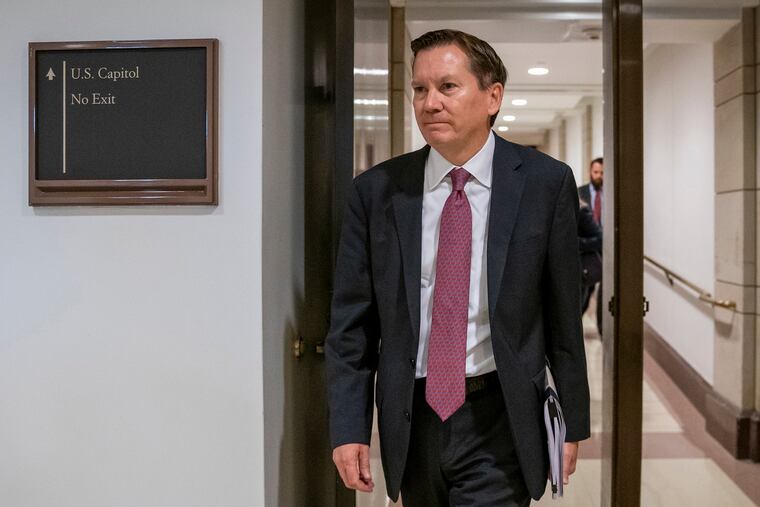Attorney General William Barr supports Trump’s ouster of intelligence watchdog who received whistle-blower complaint
Barr said Trump "did the right thing" in removing Michael Atkinson from his post as the intelligence community's internal watchdog.

Attorney General William Barr said in an interview aired Thursday that he supported President Donald Trump's controversial decision to oust the intelligence community's inspector general, whose decision to alert Congress about a whistle-blower complaint last year helped spark Trump's impeachment.
In an interview with Fox News, Barr said Trump "did the right thing" in removing Michael Atkinson from his post as the intelligence community's internal watchdog, and recalled how the Justice Department had fought against Atkinson last year when he wanted to turn the whistle-blower complaint over to lawmakers.
"He had interpreted his statute, which was a fairly narrow statute which gave him jurisdiction over wrongdoing over by intelligence people, and tried to turn it into a commission to explore anything in the government and immediately report it to Congress without letting the executive branch look at it and determine whether there was any problem," Barr said of Atkinson.
In the past seven days, Trump has drawn bipartisan criticism after he told Congress he intended to fire Atkinson in 30 days, and then effectively removed Glenn Fine from his post as the chairman of the federal panel Congress created to oversee his administration's management of the $2 trillion coronavirus stimulus package.
Critics alleged that Trump was launching an assault on a critical mechanism for good government; inspectors general are supposed to be independent, nonpartisan watchdogs ferreting out fraud, waste and abuse. The removal of Atkinson, in particular, troubled Senate Republicans, who have pushed the White House for a more detailed explanation.
A spokesperson for the intelligence community inspector general's office did not immediately return an email message seeking comment late Thursday night.
Atkinson has said previously that he was "disappointed and saddened" by Trump's decision, adding, "It is hard not to think that the president's loss of confidence in me derives from my having faithfully discharged my legal obligations as an independent and impartial inspector general." Trump has said he felt Atkinson did a "terrible job," and that he had lost confidence in the inspector general.
"I think he wants responsible watchdogs," Barr said of Trump.
That Barr would support Trump in the dispute is not entirely surprising. Barr has been one of the president's most loyal cabinet secretaries, and he has long held the view that the president should wield expansive powers in the executive branch.
Barr's Justice Department, too, also disagreed in real time with Atkinson about what should happen with the whistle-blower complaint, which alleged malfeasance in Trump's dealings with his Ukrainian counterpart, particularly during a July 25 phone call in which Trump pressed for an investigation of his political rival, Democratic presidential candidate and former vice president Joe Biden.
The inspector general felt the complaint should be forwarded to the intelligence communities in Congress, believing that was appropriate protocol because the matter was an "urgent" concern. The Justice Department's Office of Legal Counsel, however, felt that because the matter did not concern the "funding, administration, or operation of an intelligence community" matter — but instead was an allegation of possible criminal conduct by the commander in chief — it should be more properly handled as a criminal referral and not be routed to lawmakers.
That determination initially stopped the complaint from being turned over to Congress, though Atkinson made lawmakers aware of its existence. The department ultimately determined the matter did not warrant criminal investigation. The complaint and a rough transcript of Trump's call with Zelensky were eventually made public and played a major role in triggering Trump's impeachment.
In the same Fox News interview, Barr said that U.S. Attorney John Durham — who he handpicked to investigate the origins of the FBI's 2016 investigation into Trump's campaign — would likely produce a report of his findings, though that was not his main mission.
"I think a report may be, and probably will be, a byproduct of his activity, but his primary focus isn't to prepare a report," Barr said. "He is looking to bring to justice people who were engaged in abuses, if he can show that they were criminal violations."
As Trump has, Barr also expressed skepticism about voting by mail — which some states view as a necessary step to stem the spread of coronavirus — though he said he expected by the November general election "we're going to be dealing with a difference set of circumstances."
"It's not the right time to be experimenting with the way elections are conducted, that is, through mail in and other kinds of techniques," Barr said.
The comments come as some states have had to postpone their primaries in a bid to stem the spread of coronavirus — with one notable exception. Earlier this week, Wisconsin proceeded with its election after the state Supreme Court blocked the governor’s effort to suspend in-person voting.
The move inflamed partisan rancor in the state and perhaps foreshadowed some of the legal battles that could lie in the months ahead, if the virus persists.
For his part, Trump publicly encouraged people to vote for a conservative justice running in a hotly contested race for a seat on the Wisconsin Supreme Court, and suggested he was not responsible if people waiting in long lines contracted coronavirus.
"Look, all I did was endorse a candidate," Trump said. "I don't know anything about their lines. I don't know anything about their voting."
Trump has in recent days repeatedly disparaged one alternative to in-person voting, voting by mail, suggesting it is susceptible to fraud, even though he himself did so in Florida.
“I think that mail-in voting is a terrible thing,” Trump said at a recent White House briefing. “There’s a lot of dishonesty going along with mail-in voting, mail-in ballots.”